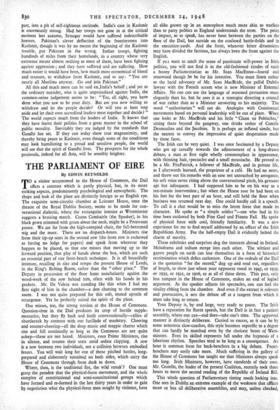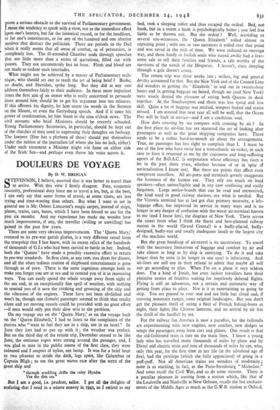THE PARLIAMENT OF EIRE
By EDWIN REYNOLDS TO a visitor accustomed to the House of Commons, the Dail offers a contrast which is partly physical, but, in its more striking aspects, predominantly psychological and atmospheric. The shape and look of the place are distinctly foreign to an English eye. The exquisite semi-circular chamber at Leinster House, once the theatre of the Royal Dublin Society, seems to be made for con- versational dialectic, where the rectangular interior at Westminster suggests a bruising match. Ceann Comhairle (the Speaker), in his black gown trimmed with green about the neck, might be a Protestant pastor. We are far from the high-canopied chair, the full-bottomed wig and the mace. There are no dispatch-boxes. Ministers rise from their tip-up seats in the second row (the front row is eschewed as having no ledge for papers) and speak from wherever they happen to be placed, so that one misses that moving up to the forward position, that play of hands about the box, which are such an essential part of our front-bench technique. It is all beautifully intimate, recalling in size and tempo the present House of Lords, in the King's Robing Room, rather than the " other place." The Deputy in possession of the floor leans nonchalantly against the wood-work of the row behind him, often with his hands in his pockets. Mr. De Valera was standing like this when I had my first sight of him in the chamber—a don chatting to the common room. I was not quite prepared for this soft, muted apostle of resurgence. Yet he perfectly suited the spirit of the place.
One misses, too, the strong tension of the House of Commons. Question-time in the Dail produces its crop of hostile supple- mentaries, but they fly back and forth conversationally—rallies of shuttlecock by contrast with our fusillade of musketry. Cheering and counter-cheering—all the deep music and magpie chatter which rise and fall continually as long as the Commons are not quite asleep—these are not heard. Ministers, even Prime Ministers, rise in silence, and resume their seats amid sedate clapping. A row is a row between two individuals, not a collision between embodied forces. You will wait long for one of those pitched battles, long- prepared and elaborately sustained on both- sides, which carry the House of Commons through from dusk to dawn.
Where, then, is the traditional fire, the wild streak'? One must grasp the paradox that the physical-force movement, and the whole complex of constitutional and semi-constitutional groups which have formed and re-formed in the last thirty years in order to gain by negotiation what the physical-force men sought by violence, have
all alike grown up in an atmosphere much more akin to warfare than to party politics as England understands the term. The point of impact, so to speak, has never been between the parties on the floor of the Dail, but outside on the confused battle-fields and in the execution-yards. And the front, whatever bitter dissensions may have divided the factions, has always been the front against the English.
If you want to catch the sense of passionate will-power in Irish politics, you will not find it in the old-fashioned tirades of such a bonny Parliamentarian as Mr. Sean MacEntee—feared and renowned though he be for his invective. You must listen rather to the lucid advocacy of Mr. Sean MacBride, the pallid Dublin lawyer with the French accent who is now Minister of External Affairs. No one can use the language of reasoned persuasion more elegantly than he, but he uses it as a strategist directing a council of war rather than as a Minister answering to his majority. The word " authoritarian " will not do. Analogies with Continental movements based on personal leadership will be out of place. When one looks at Mr. MacBride and his little " Oann na Poblachta," sitting there beyond the gangway, one thinks rather of Camille Desmoulins and the Jacobins. It is perhaps an inflated simile, but the nearest to convey the impression of quiet desperation made by those faces.
The Irish can be very quiet. I was once fascinated by a Deputy who got up casually towards the adjournment of a long-drawn debate, a man at first sight wholly commonplace in appearance, with thinning hair, spectacles' and a small moustache. He proved to be a Mr. FitzPatrick, a follower of MacBride, and in private life, as I afterwards learned, the proprietor of a café. He had no notes, and threw out his remarks with an ease not untouched by arrogance, his soft voice never rising above the conversational pitch, his gestures apt but infrequent. I had supposed him to be on his way to a ten-minute intervention ; but when the House rose he had been on his feet for the best part of an hour, and still held the floor when business was resumed next day. One could hardly call it a speech. To call it a chat would be to miss the latent force that made its character. He spoke as "a simple soldier "—one who had in his time been outlawed by both Fine Gael and Fianna Fail. He spoke of physical force with cool, friendly familiarity. It was a new experience for me to find myself addressed by an officer of the Irish Republican Army. For the half-empty Dail it evidently lacked the charm of novelty.
These subtleties and surprises dog the innocent abroad in Ireland. Melodrama and tedium merge into each other. The wittiest and gayest people on earth can lose themselves in a form of historical recrimination which defies caricature. One of the ordeals of the Dail is the quotation "for the record," dug up and read out, regardless of length, to show just where your opponent stood in 1945, or 1939, Or 1932, or 1921, or 1916, or at all of thbse dates. This pest, only less rampant in the House of Commons, makes an end of logical argument. As the speaker adjusts his spectacles, one can feel the vitality ebbing from the chamber. And even if the extract is relevant and provocative, it sets the debate off at a tangent from which it must take long to return.
Your Deputy is, by and large, very ready to pause. The Irish have a reputation for fluent speech, but the Dail is in fact a patient assembly, where one can—and does—take one's time. The approved manner is distinctly deliberate. Carried to excess, as it can be by some notorious slow-coaches, this style becomes soporific to a degree that can hardly be matched even by the choicest bores of West- minster. Even its skilled exponents fall under the hypnosis of a laborious rhythm. Speeches tend to be long as a consequence. An hour is common form for back-benchers in a big debate. Front- benchers may easily take more. Much suffering in the gallery of the House of Commons has taught me that Ministers always speak too long. Irish Ministers, however, have standards of their own. Mr. Costello, the leader of the present Coalition, recently took three hours to move the second reading of the Republic of Ireland Bill.
This whole question of Parliamentary timing needs looking into. One sees in Dublin an extreme example of the weakness that afflicts more or less all deliberative assemblies, and may, unless checked,
prove a serious obstacle to the survival of Parliamentary government. I mean the tendency to speak with a view, not to the immediate effect tipon one's hearers, but for the historical record, or for the headlines, or for one's constituents, or for any of the hundred and one ulterior motives that distract the politician. There are periods in the Dail when it really seems that all sense of combat, or of persuasion, is Completely lost. The ill-attended Chamber nods through speeches chat are little more than a series of quotations, filled out with pauses. They not uncommonly last an hour. Flesh and blood are not made to endure such interludes.
What might not be achieved by a master of Parliamentary tech- nique, who should set out to teach the art of being brief ? Burke, no doubt, and Sheridan, spoke long. But they did at any rate address themselves fairly to their audience. In these more impatient times the first aim of an orator who is really concerned to persuade those around him should be to get his argument into 'ten minutes. If this affronts his dignity, let him count the words in the Sermon on the Mount, or even the Gettysburg speech. And if it taxes his power of condensation, let him listen to the nine o'clock news. The civil servants who brief Ministers should be severely schooled. Young Parliamentary Secretaries, in particular, should be kept out of the clutches of men used to expressing their thoughts on foolscap. The lawyers (Eire has a plethora of these) should put themselves under the tuition of the journalists (of whom she has no lack, either). Under such treatment a Minister might win fame on either side of the Irish Sea—and perhaps even throw his voice across it.



































 Previous page
Previous page